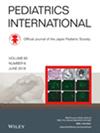Severe acute respiratory syndrome coronavirus 2 infection rate among pediatric patients with respiratory symptoms
IF 1
4区 医学
Q3 PEDIATRICS
引用次数: 0
Abstract
BackgroundThe incidence of coronavirus disease 2019 (COVID‐19) in children has been increasing worldwide since the onset of the pandemic. This study examined the risk factors and characteristics of COVID‐19 among pediatric patients compared to other respiratory viral infections.MethodsThis was a prospective cross‐sectional study. Patients aged 0–18 years presenting with respiratory symptoms from October 2020 to December 2021 were included. Demographic and clinical data were reviewed.ResultsIn total, 738 pediatric patients were enrolled. Of these, 48.5% had COVID‐19, and 41.3% were infected with another respiratory virus. The COVID‐19 incidence increased from 0.5% during the original strain outbreak (October 2020 to March 2021) to 56.5% and 73.4% during the alpha (April to June 2021) and delta (July to December 2021) periods, respectively. Children aged 6‐18 years, being female, obesity, exposure to household members with COVID‐19, and the delta period were risk factors for COVID‐19. Being aged 1‐5 years, obesity, shortness of breath, productive cough, and chest pain were associated with COVID‐19 pneumonia. Children aged 5–18 years, underlying neurological disease, a history of COVID‐19 pneumonia, and the delta period were associated with long COVID.ConclusionsPediatric COVID‐19 patients presenting with respiratory symptoms who are obese or have been exposed to household members with COVID‐19 should be tested for COVID‐19. COVID‐19 patients who are obese, younger than five years old, or who present with shortness of breath, productive cough, or chest pain should be evaluated for pneumonia. COVID‐19 patients with a history of COVID‐19 pneumonia or underlying neurological disease should receive follow‐up for long COVID.有呼吸道症状的儿科患者中的严重急性呼吸系统综合征冠状病毒 2 感染率
背景自2019年冠状病毒病(COVID-19)大流行以来,全球儿童的发病率不断上升。本研究探讨了与其他呼吸道病毒感染相比,COVID-19 在儿童患者中的风险因素和特征。研究纳入了 2020 年 10 月至 2021 年 12 月期间出现呼吸道症状的 0-18 岁患者。结果共纳入 738 名儿科患者。其中,48.5%感染了COVID-19,41.3%感染了其他呼吸道病毒。COVID-19的发病率从原始毒株爆发期(2020年10月至2021年3月)的0.5%上升到α期(2021年4月至6月)的56.5%和δ期(2021年7月至12月)的73.4%。6-18岁儿童、女性、肥胖、接触过感染COVID-19的家庭成员以及δ期是感染COVID-19的风险因素。1-5岁儿童、肥胖、呼吸急促、有痰咳嗽和胸痛与COVID-19肺炎有关。结论出现呼吸道症状的小儿 COVID-19 患者如果肥胖或曾接触过患有 COVID-19 的家庭成员,应接受 COVID-19 检测。肥胖、5 岁以下或出现气短、有痰咳嗽或胸痛的 COVID-19 患者应进行肺炎评估。有COVID-19肺炎病史或潜在神经系统疾病的COVID-19患者应接受长期COVID随访。
本文章由计算机程序翻译,如有差异,请以英文原文为准。
求助全文
约1分钟内获得全文
求助全文
来源期刊

Pediatrics International
医学-小儿科
CiteScore
2.00
自引率
7.10%
发文量
519
审稿时长
12 months
期刊介绍:
Publishing articles of scientific excellence in pediatrics and child health delivery, Pediatrics International aims to encourage those involved in the research, practice and delivery of child health to share their experiences, ideas and achievements. Formerly Acta Paediatrica Japonica, the change in name in 1999 to Pediatrics International, reflects the Journal''s international status both in readership and contributions (approximately 45% of articles published are from non-Japanese authors). The Editors continue their strong commitment to the sharing of scientific information for the benefit of children everywhere.
Pediatrics International opens the door to all authors throughout the world. Manuscripts are judged by two experts solely upon the basis of their contribution of original data, original ideas and their presentation.
 求助内容:
求助内容: 应助结果提醒方式:
应助结果提醒方式:


